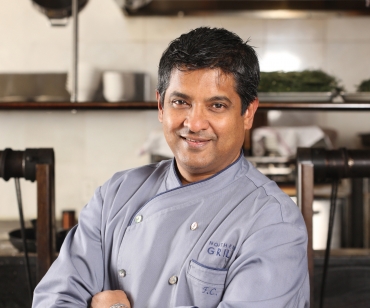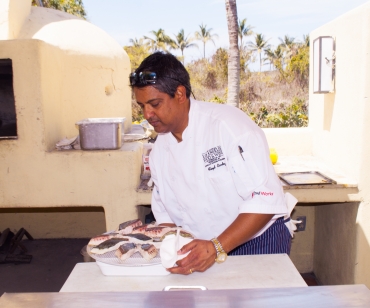Chefs and Restaurants
Remembering My Friend and Favorite Chef, Floyd Cardoz
Editor's Note: Plate is making coverage of the coronavirus available to all readers. Find more articles here.
I met Floyd Cardoz the way I meet most chefs—formally interviewing him in the dining room of his restaurant. In 2012, that restaurant was North End Grill and the interview for my We Chat With… series for Serious Eats. I’d missed out on Floyd’s glory days at Tabla and so couldn’t echo the “I was there” reverence still pinging around New York City to this day. No, I never witnessed that achievement; his having succeeded in his mission to present a new kind of Indian cuisine to New York.
But that’s not what Floyd wanted to talk about, anyway. He was always quick to dismiss the pains of his past with a furrow of the brow or an eye roll, preferring instead to talk about what he was cooking today, and why.
Then, those big brown eyes would dance.
Floyd talked to me about growing up in Mumbai in a large upper-middle class family that employed several cooks and entertained regularly. A voracious eater from a young age, he’d come home from school excited for lunch, and then fantasize through the afternoon about what he’d return to find for dinner. He was always in the kitchen; his older brother nicknamed him “the cook’s son,” a cultural slight that echoed in the resistance he later faced when he chose to cook professionally; a career path not embraced by those of his family’s social class. But he loved the kitchen, and proximity was how he put in special requests; fish, in particular.
He coveted fish because his family summered with his great-grandmother 600 kilometers away in Goa, a cultural melting pot of a city on the coast of the Arabian sea amongst rice paddies and coconut plantations. There, he’d watch fishermen throwing their nets and collect small clams for cockle palau. They’d slaughter chickens and pigs and a fatted calf to make stews and wetly spiced sausages. The house had no electricity, gas, or running water, so they’d market daily and cook what they collected in earthen pots over a wood-burning fire. “As a kid, that was always pretty damn cool,” he later told me of these times.
His deep love for Goa is what first inspired Floyd to push the breadth of Indian cuisine forward. It was also the point of connection that led us to become friends.
My father immigrated from Portugal, and Goa was a Portuguese colony until 1961. My godfather is a Goan Catholic priest, and Floyd was raised Catholic in a country that is almost 80 percent Hindu. We fell into discussing how this storied history of cultures and religions clash and meld in Goan cuisine; how uniquely our Indian and Portuguese heats meet and mingle there; how beef and chorizo complement the texture of lentils and the cream of coconut and all those sweet and smoky curry spices.
We also shared a respect for those who stubbornly overcome societal obstacles.

I particularly admired how Floyd kept a notebook of the wrongdoings he witnessed as a young cook facing discrimination in New York so that he would remember what to change when he became a chef. (Taking such notes about his leadership was something he’d later advise his cooks to do.) When he found out that I have chronic health issues and had decided to write about people who make food so as to not hate what I can’t eat, he looked me square in the eyes and told me food should not only help celebrate, but also heal; I would always be safe with him in the kitchen. And I was. He fed me at his restaurants for both bad dates and quick lunches, and on big occasions, like when my radio co-host and I celebrated closing out our final episode. He and his wife, Barkha, fed me at their home after Floyd taught me how to properly sharpen my knives with a stone. We'd sit at their dining room table, ribbing Barkha for chopping vegetables with a paring knife, and daydreaming about future cookbooks.
That was the kind of human Floyd was: present, passionate, strong-willed, dedicated to a stubborn degree, and incredibly kind.
It was his kindness that first attracted his wife's the attention when they met in hospitality school in Mumbai.
To be friends with Floyd was to be friends with his family—the Cardozes are a package deal—and nothing made those eyes dance more than a mention of Barkha or their sons, Peter and Justin. When I interviewed Floyd and Barkha together on my radio show, Floyd offered that his culinary success was only possible because of their marital success; Barkha, that their marital success only so because of their friendship.
Seven years after first meeting in college in India, Floyd and Barkha reconnected on a road trip with mutual friends, after having emigrated separately to the New York City area; he lived in the city while she lived in New Jersey. In their early days of courtship, Floyd would meet Barkha’s bus every morning at the Port Authority so that they could have breakfast together before he walked her to work. He’d run to her office for coffee between shifts. On his day off, he’d take “take her home” to New Jersey on the bus so they could share a little more time, and then he’d hop a bus right back to the city to his own apartment.
“I had never, ever been in a relationship where you felt good about yourself, you were safe, and you knew that someone always had your back,” Barkha told me. “There was never a point in that timeframe of my life where I felt like I was alone. I still don’t. No matter what goes on, he’s always got my back.”
Floyd was always quick to point out that Barkha always had his, too; that she’d shifted her career to financially support their growing family while he climbed the ladder to executive sous-chef at Lespinasse because she was the one who believed Chef Gray Kunz had something vital to teach him. It bothered Floyd to miss Christmases and birthdays and football games and fencing tournaments as their boys grew older. “But when someone has that passion, they’re blessed,” Barkha noted. He had told her back in college that someone needed to add flavor to French cuisine, and he was going to be the someone to do it. “You can’t put impediments in their way because their purpose is to do what they’re doing,” she said.
They succeeded in their mission when they opened Tabla in 1998, and again with every cookbook and kitchen that followed.
Ruth Reichl hailed Tabla, noting “The flavors are so powerful, original and unexpected that they evoke intense emotions.” After Tabla closed and he opened North End Grill, Floyd had a rooftop garden (oh, how he loved to garden!) and a broader ingredient palette: “My food will always have multiple textures and flavors – sweet, sour, spicy, bitter, hot – playing off each other,” he told me in 2012. “But I could today cook a steak that’s Japanese-influenced, and tomorrow cook a steak that’s Italian-influenced, and there’s nothing to stop me from doing that.” When he opened Paowalla in 2016, he let himself be fearless, composing a fun small-plates menu of dishes from all over India (many of which were Barkha’s creations) and a range of oven-fired breads for which Paowalla was named; it is the Portuguese-Hindi word for the local breadman. “Bread is fundamental in a Goan home,” he shared with me before that opening in 2017. “I want this restaurant to be fundamental.” His bread became so fundamental to eaters that he reopened the refined Paowalla as the jumpier, flashier, more casual Bombay Bread Bar a year-and-a-half later, echoing the energy of the Bread Bar he opened below Tabla back in the 90s.
Here is where I want to express fury or a rue such as Chandra subtly penned about Tabla’s 2010 closing in her editorial for Plate’s recent Modern Indian issue. Because Floyd had to close Bombay Bread Bar last summer. For all the credit given to him for having paved the way for modern Indian chefs to follow, his not having sustained success in the city in which he took so much pride swallows like a burn.
But again, I remember his face: that furrow, that roll of the eyes, and that stubborn will to keep moving forward.
“When you do something good for people, it's not because you want something good to come out of it; you do it for the goodness of your heart and soul, what your parents teach you to do,” he told me in that first meeting. “I believe that if everybody does their part, this would be a better place to live in.”
Floyd did good by those who love to cook. He believed that only when one had mastered proper technique could creativity be given free reign. (And Floyd could be silly, dancing his way through a fish market or good-naturedly mocking another chef’s concentration.) He expected professionalism and assumed respect: I once witnessed a sous call him “Floyd” off the clock, and his response mingled fury and hurt—once a chef’s your chef, that title shouldn’t budge. But he’d also generously lead an intern through the magic of his spice room or teach someone how to properly toast nigella seeds or mandolin ginger, because he remembered watching line cooks repeat failures without assistance, and he’d promised to do better by his jacket.
Floyd did good by those who love to eat. He wanted his restaurants to feel like a party, because that’s what food was to him while growing up. He’d thrill at explaining a dish because it gave him the chance to teach about an ingredient or a place, or just because it was vegan and he was excited that someone on a vegan diet could eat it. Guests felt like family because his restaurants were his second home: His sons grew up at Tabla, and at Paowalla, it was just as common to see Justin or Barkha roaming the dining room as it was Floyd.
Fame came his way when he won Top Chef Masters in 2011, and in keeping with his nature, Floyd did good by it. He donated his $110,000 winnings from the show to the Young Scientists Cancer Research Fund, which he started with Dr. Goutham Narla—a Tabla regular and Mt. Sinai researcher—after his son Peter had finished a transformative internship in Narla’s lab. Floyd and Barkha learned how rare such laboratory internships are, and wanted to make them accessible to burgeoning scientists from all backgrounds. Reframed as The Young Scientists Foundation, their yearly fundraisers featuring a rotating roster of Floyd’s chef friends have since raised hundreds of thousands of dollars and placed dozens of young scientists in internships.
He may have won a huge culinary competition, but Floyd made a conscientious effort to not emulate celebrity chefs more focused on fame than their cooks or their kitchens. When a guest once cold-called North End Grill with a question about a recipe, he spent twenty minutes talking her through it. He knew it took courage for fans to ask for a picture, and he took the time for everyone who asked. “The nicer you are to people, the nicer they are to you,” he told me, “Success is great. Being a celebrity chef is great. But you have to sleep with yourself every night.”
Floyd was so nice that if Barkha came home from work hungry at 2am, he’d rise from sleeping to cook for her. And as my illness advanced with passing years, both Floyd and Barkha continued to sustain me with food and friendship, offering to deliver meals when I became more homebound and connecting me with Peter when I had questions about a new course of treatment he could answer from his lab. Over the last eight years and dozens of formal and informal interviews, I've filled up at his many tables on dishes with names I don't remember. But when people ask where I get the best Indian food in New York, my answer is clear: "at Floyd and Barkha's house."

In the 24 hours since news of his passing broke, we’ve witnessed countless stories of the good Floyd has done as chef, friend, and mentor to many. I worry about the real little family in the middle of the extended one created by their goodness. I go back to the things he loved, like the fish that reminded him of home and family. Memories like the time we traveled to Mexico together for the Punta Mita Gourmet and Golf Challenge. Floyd seemed a touch embarrassed when he didn't catch anything after a morning fishing on rough waters, but he still wowed afterward, preparing a pompano ceviche with tamarind both, jicama, and mango—he was so excited by that fatty, beautiful fish. I find comfort in recalling that his comfort food was fish curry with rice; I hope to cook some to maybe comfort myself in this cruel, isolated period of mourning. My heart breaks remembering him saying that his ideal “last supper” would have been his mom’s xacuti and Barkha’s saag gosht. And that we’ll never taste what Floyd had coming next for us.
“Seeing a lot of people accepting what he does, acknowledging what he does – not just his food but his sheer diligence, hard work, discipline… as someone growing up in India, I never dreamed I would watch Indian food take on the role it takes on today,” Barkha told me in that radio interview. “It’s paid off big for all of us, just to see that.”
Now, we honor Floyd by paying it forward.
Jacqueline Raposo is a New York-based food writer, author and the creator of the podcast, Service: Stories of Hunger and War.

Gordon N. replied on Permalink
Liza C. replied on Permalink